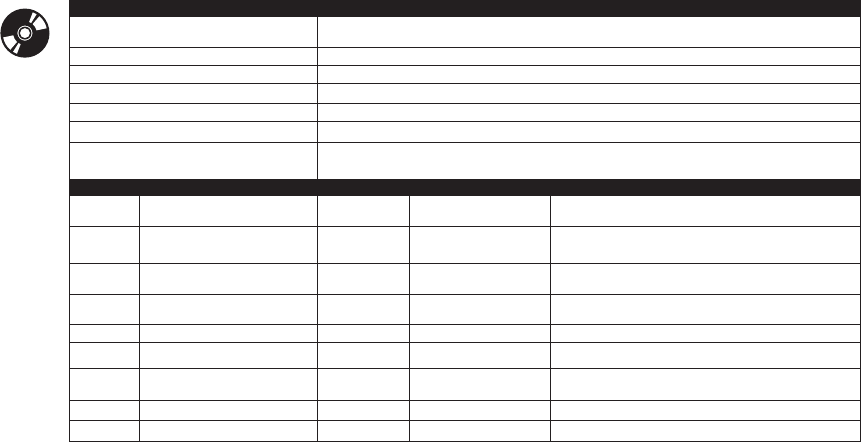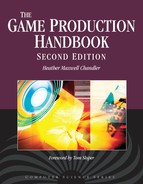VOICEOVER 167
What size is the studio? If there is a need to record multiple actors at once,
can the studio’s recording booth accommodate this? If several people are
present at the recording session—writer, producer, sound designer—is the
studio large enough for all of them?
Are they set up for phone patch-ins? If someone must participate in the
recording session, but they are unable to physically be at the studio, can they
be patched into the session via the phone? This ability is especially useful if
you are working with a studio in another city.
What is the turnaround time for audio deliverables? How quickly can
they turn around the audio after the recording session? This estimate must
be included in the schedule. You might need to make this a deciding factor
when choosing a studio if the project is on an accelerated schedule.
What options are available for receiving audio deliverables? Will
the audio assets need to be burned to a CD and mailed to you, or can they
be posted on an FTP site? Can the files be delivered in different file for-
mats and with different compression schemes? Is the studio willing to use
proprietary software to convert the files to the preferred file format for the
game?
What are the rates? Studios usually charge hourly or daily rates for the
actual time that actors will be recording in the studio. They also charge rates
for processing the files after the recording session. In addition, rates are
charged for the actors’ time, and these rates will differ for each actor.
What additional costs are incurred? Examples of services that incur ad-
ditional costs are auditioning and casting actors, directing actors, writing
dialogue, and so on. Extra costs may also be incurred for discs, meals, post-
age, and so on.
How much advance is needed to book studio time? A studio might be
booked several months in advance or might need to be booked only a week
in advance. It is also good to know what the chances are for booking any last-
minute, pick-up sessions.
Bid Packages
Sending bid packages to several sound studios gives you an opportunity to com-
pare prices and services, enabling you to choose the best studio for your project.
Getting multiple bids is also a good way to learn how much time the studios will
need to record the voiceover and how responsive they are with questions.
Studios might have a preferred format for receiving bids, so check with them
first to see whether they have specific bid forms you must use. If they don’t
have a specific form, check with them as to what information is needed and
168 THE GAME PRODUCTION HANDBOOK, 2/E
create a form that will clearly present the key information the studio will need
to calculate the bid. At a minimum, they will need to know how many lines of
dialogue will be recorded, how many unique game characters will have dialogue,
and how many actors will be used to record this dialogue.
Sending an estimated line count is very important when creating a bid
package. This count is the basis of much of the studio’s time and cost es-
timates. First, each studio might have a different method for determining
line count, but generally you should count each sentence (about eight to ten
words) as one line. Don’t make the mistake of basing the actual line count
on how many rows are used in the voiceover spreadsheet (see Figure 10.3),
as this method might give an inaccurate count if an actor has a paragraph of
dialogue listed in a single cell on the spreadsheet. A miscalculation in the line
count makes it very difficult for the studios to accurately schedule the actors
and determine costs.
For example, actors are booked for a maximum of four hours for a single
recording session. If they exceed this four-hour period because the line count
was much larger than planned, they will need to be rescheduled for an additional
recording session, which incurs extra time and cost. Also, they might be unable
to reschedule during the time you have already booked with the studio, which
means the actor and studio both have to find another time to finish the session.
This delay could put the game project’s schedule at risk.
Other important information to include in the bid is how many unique voices
are being recorded and how many actors are needed to record them. According to
the rules of the Screen Actors Guild (SAG), a SAG actor is allowed to record up
to three unique voices in a single recording session for a flat fee. If they do any ad-
ditional voices, they must receive extra compensation. If you carefully manage the
expectations for the character voices in the game, you can cast actors to do multiple
voices, and thereby save money. For example, if you have a skilled voiceover actor
do three minor roles in the game, you need to cast and pay for only one actor.
If casting for a major voice that will be heard throughout the game, you
probably want to have the actor chosen for that role perform only that voice. This
way the actor can focus on bringing the main character to life, and the voice will
stand out as unique in the game. Additionally, the amount of dialogue for a major
character in the game might require several recording sessions, which means
there would not be time for the actor to record additional voices in a session.
With regards to cost, another thing to keep in mind is that actors get paid for
a four-hour minimum. So if the actor is only needed in the recording studio for
one hour, he will still get paid for four hours of work. Because you have to pay for
the actor’s time anyway, it is good to record as much dialogue as you can during
the session—alternate line reads and additional generic lines that can be used in
the game (such as greetings, screams, and anything else that might prove to be
useful later in development).
VOICEOVER 169
Other things to include in the bid request are as follows:
File processing: Indicate whether you want the sound studio to fully
process all the files and remove pops, clicks, and other sound artifacts from
the final audio files. Also indicate whether you will need any special effects
processing for the files, such as radio futz.
Unique actor needs: For example, if you are looking for an actor who can
do a certain accent or speak a specific language, include it in the bid request.
Although this need will not affect the studio recording fee, it might affect
the actor fee.
Union or non-union: If the project requires union actors, additional union
fees are added to the bid for the actors’ time. Union vs. Non-union actors is
discussed later in the chapter.
File delivery formats: Indicate in what format the files are to be delivered.
For example, you would need to specify uncompressed .wav files at 24 bit/96
kHz. If you want additional file formats, such as compressed 16 bit/44 kHz,
indicate that as well. Also, detail how you want these files delivered—burned
to a disc, uploaded to an FTP site, and so on.
Tentative schedule: Let the vendor know on what type of schedule you
want to work. Indicate when you will be able to deliver the final line count
and final voiceover script and when you need to receive the final audio files.
This planning will help the vendor manage his time. The vendor might
have to speed up the turn-around time for the final audio deliverables to
accommodate the game’s audio schedule. If the vendor does not have the
time or resources to take on a project with certain schedule constraints, he
can let you know during the bid process.
Figure 10.5 is an example of a VO bid that would be sent to a VO vendor. In
this example, the VO vendor will need to book the actors who are playing these
same characters in the film. Securing celebrity voiceovers may add some addi-
tional time to the schedule.
10.4 CASTING ACTORS
Casting the correct actor for a role is one of the most important aspects of the
voiceover process. If the correct actor is cast, he can go beyond recording lines
of dialogue and instead add something extra to the character and really bring it
to life. Casting actors has many elements you should consider to ensure you get
the right person for the job.

170 THE GAME PRODUCTION HANDBOOK, 2/E
Union Versus Non-Union
One of the first things to consider is whether you will hire union or non-union
actors. Your choice depends on the project’s budget, the scope, and the schedule.
Non-union actors are cheaper, since there are no additional charges for union fees.
However, talented non-union actors are difficult to find. When using non-union
actors, even though you are saving money up front, you could end up spending
more if it takes a long time to find suitable actors, or if the actors need numerous
chances to record each line correctly. If the project’s voiceover needs are mini-
mal, around a few hundred lines, using non-union actors is not a big risk.
In the United States, union actors are members of the Screen Actors Guild
(SAG), the American Federation of Television and Radio Artists (AFTRA), or
sometimes both. Union actors are more readily available because they can be
contacted through databases maintained by SAG and AFTRA. Costs for using
union actors include the actor’s normal fee, plus an additional percentage that
goes directly to the union for the actor’s pension and health benefits.
Additionally, union actors have very strict work guidelines and must be paid
according to a fee schedule set by the union. For example, all union actors must
be paid for a minimum of four hours of work, regardless of how long the session
actually took. Also, union actors are limited to no more than three unique voices
or characters per recording session. Any extra voices cost additional money.
O
N
T
H
E
C
D
FIGURE 10.5 Example of a voiceover bid.
Character Est. # of lines
Male/Female Age
Notes
Bullet Point 5,000
M25
Need to get actor who is playing this character in the
movie.
Melanie
Cole 5,000
F26
Need to get actor who is playing this character in the
movie.
Caribou 3,000
M24
Need to get actor who is playing this character in the
movie.
Teacher 1,000
F65
Actor needs to speak Chinese and English. The actor
can also voice other characters in the game.
Sam 1,000
M21
Actor can voice other characters in game.
Woman #1 50
F mid-forties
This actress will voice 3 characters
Woman #2 75
F early-forties
Voiced by same actress who does Woman #1.
Man #1 50
M mid-forties
This actor will voice 3 characters
.1#
naM seod
o
h
w
ssertca emas y
b
decioVseitrih
t-
d
imM572# naM
Required Processing. List any special
effects needed.
Basic edits for pops and clicks, name files according to file naming system provided by
developer.
Channels. (Mono/Stereo/5.1).. Dolby 5.1
stam
rof yrevile
d eliF
Bit depth. (ex: 8 bit, 16 bit, etc) 16 bit
Sample Rate. (ex: 22 Khz, 44Khz) 44Khz
VOICEOVER ASSETS
Union or Non-union (English version) Union
Any celebrity talent used? Include
celebrity names in "Notes" column in table Yes, the actors who play the main characters in the movie, will also voice them in the game.
uncompressed. wave files

VOICEOVER 171
Union actors are more expensive to hire, but this cost can be justified as they
are certified professionals. If you are working on a large project and need to hire
several actors, you might want to consider hiring union actors.
Celebrity Voices
In the last few years, the use of celebrity voiceovers has become very popular.
Using celebrities lends a cinematic quality to the game and is useful for market-
ing and public relations (PR) purposes. However, additional time must be added
to the schedule, because contracts need to be signed, and approval might be
required for the final voiceover files that appear in the game. Additionally, there
might be restrictions on the actor’s availability and how many hours of recording
he can do. If using celebrity voiceovers, start pre-production for the voiceover
process earlier so there is time to deal with any unexpected issues.
If you are using an internationally well-known celebrity, check with his agent
to see how the celebrity’s voiceover for the localized versions should be handled.
The publisher might be contractually obligated to use a specific voiceover actor
who has been approved by the celebrity to dub his lines into other languages.
This situation was the case with Bruce Willis, who voiced the lead character in
Apocalypse, a PlayStation game published by Activision. He recorded the char-
acter’s lines in the English version, and specific actors whom he already had ap-
proved recorded the lines in the localized versions.
WORKING WITH CELEBRITY VOICES
Stuart Roch, Executive Producer
Activision
We were fortunate that we worked as closely with the Matrix production team
as we did. Getting AAA Hollywood talent into the recording studio for dialogue
recording can be a real trick, but with the help of the film production, we were able
to schedule time with the Matrix talent on days where they had a light shooting
schedule or on days between their primary film commitments. Through the coop-
eration of the Wachowski Brothers and the Matrix production team, the scheduling
of time with the primary talent for things like voiceover, motion capture, or digital
photography went off without any problems. We recommend working with the film
production office as closely as possible to ensure that the time you need to spend
with the talent is organized, therefore, making it as painless as possible for both the
game development team and the actors themselves.
..................Content has been hidden....................
You can't read the all page of ebook, please click here login for view all page.
